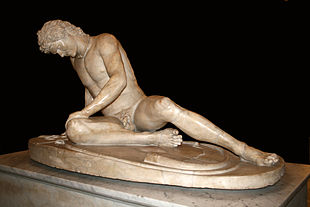Ο Ναπολέων κατόρθωσε να εξάγει τη Γαλλική Επανάσταση στην Ευρώπη και μερικά από τα θαυμαστά της επιτεύγματα. Στο Αμπουκίρ, στο Άουστερλιτζ, στην Ιένη, στο Μποροντίνο κέρδισε άλλοτε με συντριπτικά χτυπήματα και άλλοτε με μεγάλες απώλειες τους ηγεμόνες της παλιάς Ευρωπαϊκής τάξης. Κάποιοι από αυτούς άλλαξαν τον τρόπο σκέψης τους, ενσωμάτωσαν αρχές και ιδέες της Γαλλίας και επανέκαμψαν για ένα καίριο χτύπημα στη Λειψία, στις 19 Οκτωβρίου 1813.
Στο συνέδριο της ειρήνης που ακολούθησε οι νικητές δεν επέλεξαν να συντρίψουν τη Γαλλία και έστειλαν τον Βοναπάρτη στην εξορία. Όλα άλλαξαν όμως όταν ο Κορσικανός δραπέτευσε από τη νήσο Έλβα και οδήγησε μια νέα στρατιά απέναντι στους ενωμένους εχθρούς του στις 18 Ιουνίου του 1815. Ήταν οι 100 ημέρες της τελευταίας αναλαμπής του ολετήρα της ηπείρου μας.
Ο στρατάρχης Μπλούχερ και ο Ταλλεϋράνδος
Το καλοκαίρι του 1815 οι Πρώσοι και οι σύμμαχοί τους μπήκαν στο Παρίσι. Ο στρατάρχης Μπλούχερ ναρκοθέτησε τη γέφυρα της Ιένης στον Σηκουάνα, που χτίστηκε για να θυμίζει στον κόσμο την οδυνηρή ήττα των Πρώσσων από τους Γάλλους το 1806. Ο επανακάμψας Ταλλεϋράνδος, πρωθυπουργός της Γαλλίας απείλησε μέσω απεσταλμένου ότι θα σταθεί ο ίδιος στο κέντρο της γέφυρας για να μην την ανατινάξει ο Γερμανός στρατηγός.
Ο Μπλούχερ σκέφτηκε λίγο και ζήτησε από τους στρατιώτες του να μην πυροδοτήσουν τα εκρηκτικά, μέχρι να φτάσει όντως ο Ταλλεϋράνδος στο κέντρο της γέφυρας, για να τον ανατινάξει κι αυτόν. «Μπλούχερ» ονόμαζαν οι Γάλλοι τα άγρια, αιμοβόρα σκυλιά τους, για αιώνες μετά. Τον Ταλλεϋράνδο αντίθετα τον θεωρούν ως τον ευεργέτη της Γαλλίας, καθώς με περίτεχνες διπλωματικές ενέργειες κατάφερε να αποτρέψει την διάλυση της. Αυτό τουλάχιστον διδάσκεται στα γαλλικά σχολεία.
Η αλήθεια όμως είναι ότι οι ιστορικοί πιστεύουν σήμερα τη θεωρία του «ευεργέτη» Ταλλεϋράνδου έχοντας ως πηγή ένα κείμενο της εποχής: το πόνημα του ίδιου του Γάλλου ευγενή για τις ενέργειές του στα συνέδρια της ειρήνης. Η αλήθεια είναι επίσης ότι σε αυτή την πιο κρίσιμη φάση για τη Γαλλία, είχε ξεμείνει από ραδιουργίες και παλιομοδίτικη ακόμα και για την εποχή γοητεία. Απείλησε τους συμμάχους ότι θα παραιτηθεί αν η Γαλλία διαμελιζόταν. Οι σύμμαχοι αδιαφόρησαν και ο Βουρβόνος βασιλιάς δέχτηκε την παραίτησή του.
Ο πέμπτος δούκας του Ρισελιέ
Ο ArmandEmmanueldeVignerotduPlessis, 5ος δούκας του Ρισελιέ, είχε τόσο μακρά σχέση με τους «νόμιμους» βασιλιάδες της Γαλλίας όση υποδηλώνει το όνομά του. Έφυγε από τη Γαλλία μετά την επανάσταση και υπηρέτησε τον Ρώσο αυτοκράτορα. Αυτός του ανέθεσε μεταξύ άλλων την ίδρυση της πόλης της Οδησσού. Η οργανωτική του ικανότητα ήταν πολύ πάνω του μετρίου. Μια λαμπρή ρωσική πρωτεύουσα θα δέσποζε πια στη Μαύρη Θάλασσα για του αιώνες που θα έρχονταν.
Ο Ρισελιέ γύρισε στη Γαλλία μαζί με τους βουρβόνους και ανέλαβε την πρωθυπουργία μετά τον Ταλλεϋράνδο. Μετέβη απελπισμένος στα δωμάτια που είχε καταλύσει ο Τσάρος στο Παρίσι. Του είχαν μόλις ανακοινώσει τη διάλυση της Γαλλίας, τόσο εδαφική όσο και οικονομική. Τον δέχτηκε ο νέος εξ’ απορρήτων του Αλεξάνδρου Α΄, ο κόμης Ιωάννης Καποδίστριας, με τον οποίο φαίνεται να γνωρίζονταν καλά. Ο Ρισελιέ μίλησε στον Καποδίστρια για τα δεινά που περίμεναν τη Γαλλία. Αυτός τον άκουσε ήρεμος και του είπε:
«Κατέχω ένα αλάνθαστο τρόπο για να σωθεί η χώρα σας σήμερα. Αύριο θα είναι αργά. Θέλετε να τον ακούσετε;»
«Εννοείται» απαντά ο Ρισελιέ.
Ο Καποδίστριας πήγε στο διπλανό δωμάτιο και υπαγόρεψε στον γραμματέα του, Αλέξανδρο Στούρτζα μια ψεύτικη επιστολή από τον Λουδοβίκο ΙΗ΄ προς τον τσάρο. Σε αυτήν έλεγε πώς προτιμούσε να ακουμπήσει την κορώνα κάτω από τον θρόνο για να την πάρουν οι σύμμαχοι, παρά να παραδώσει την Γαλλία ταπεινωμένη και διαμελισμένη σε αυτούς.
Η επιστολή αντιγράφτηκε πιστά από τον Λουδοβίκο και ιδιοχείρως. Την επομένη ο Στούρτζα την μετέφερε στον ειδοποιημένο Τσάρο την ώρα που συνεδρίαζε με τους συμμάχους. «Όπως το περίμενα», αναφώνησε ο Τσάρος έκπληκτος. «Είμαστε τώρα πιο ντροπιασμένοι από ποτέ. Ο Λουδοβίκος παραιτείται και καλά κάνει. Η Γαλλία δεν έχει βασιλιά. Βρείτε μου έναν άλλον αν μπορείτε. Όσον αφορά εμένα, δεν έχω καμία σχέση με αυτό. Ήρθε ο καιρός να πάω σπίτι μου και όλο αυτό να τελειώσει»[1].
Η αποφασιστικότητα του Αλέξανδρου θορύβησε τους πάντες. Η οργή του καταλάγιασε τα πάθη εναντίον της Γαλλίας. Εκείνη την ημέρα, εκείνη τη στιγμή σώθηκε η Γαλλία από την καταστροφή. Και την έσωσε η διορατικότητα του Κερκυραίου κόμη και η υποκριτική τέχνη, αυτού που ο Ναπολέων αποκαλούσε τον μεγαλύτερο ηθοποιό της ανατολής (με τον οποίο, όπως επίσης έλεγε, αν ήταν γυναίκα, σίγουρα θα είχε συνάψει σχέση μαζί του).
Οι μαρτυρίες
Η μικρή αυτή ιστορία είναι εξόχως σημαντική για τους Γάλλους. Αν δεν υπήρχε αυτή η παρέμβαση η χώρα τους σήμερα δε θα ήταν αυτή που είναι. Αν δεν υπήρχε η πολιτική που ο Καποδίστριας εισηγήθηκε στον τσάρο και οδήγησε 3 χρόνια μετά στην οριστική επανένταξη της Γαλλίας στο κογκλάβιο των Μεγάλων Δυνάμεων η Γαλλία θα ήταν σήμερα μια μικρή χώρα, σαν το Βέλγιο, με ένδοξο όμως, επαναστατικό παρελθόν. Και η Ευρώπη θα είχε τσακιστεί από δεκάδες πολέμους πολύ πριν τους μεγάλους πολέμους που προκάλεσε η Γερμανία τον επόμενο αιώνα.
Ο Ρισελιέ έγραψε στον τσάρο την 1η Οκτωβρίου του 1815: «Εξαιτίας της δικής του στιβαρής παρέμβασης λάβαμε την χαλάρωση των όρων. Γνωρίζω ότι ο κόμης Καποδίστριας ήταν εκτός των οδηγιών του. Τολμώ να παρακαλέσω την μεγαλειότητά σας να μην τον αποκηρύξετε».
Κι ανάμεσα σε άλλους ο κόμης Μολέ έγραφε στα απομνημονεύματά του: «Αν η Γαλλία είναι ακόμα η Γαλλία, το οφείλει σε τρεις άνδρες, των οποίων δεν πρέπει ποτέ να ξεχάσει τα ονόματα. Στον Αλέξανδρο και δυο υπουργούς του. Τον Καποδίστρια και τον Πότσο Ντι Μπόργκο[2]»
Η αμοιβή
Δεν χωράει αμφιβολία ότι ο Καποδίστριας εκτός από την καθαρά διπλωματική μεγαλοφυή του σύλληψη για τη θέση της Γαλλίας στην ισορροπία των δυνάμεων που θα ειρήνευε την ήπειρο, προσδοκούσε και άλλα κέρδη από τη στάση του προς αυτή. Πίστευε ότι στον σχεδιαζόμενο από τότε ξεσηκωμό των Ελλήνων η Γαλλία θα στεκόταν αρωγός και αντίβαρο στην αρνητική στάση της Αγγλίας. Η ιστορία τον δικαίωσε στο ακέραιο.
Είναι άγνωστο αν ο Ρισελιέ και ο Λουδοβίκος ήταν γνώστες αυτού του σχεδιασμού. Ίσως γι’ αυτό του πρότειναν πιο χειροπιαστές ανταμοιβές. Ο Λουδοβίκος του πρότεινε χρυσάφι. Ο Καποδίστριας αρνήθηκε. Ζήτησε μόνο τα διπλά αντίτυπα των βιβλίων που υπήρχαν στις βιβλιοθήκες της Γαλλίας με αρχαία ελληνικά κείμενα. Ήθελε να τα στείλει στην Κέρκυρα, στη βιβλιοθήκη που σχεδίαζε να ιδρύσει.
Το αίτημα του έγινε μεν δεκτό, όμως δεν υλοποίηθηκε ποτέ, από όσο γνωρίζουμε. Αντ’ αυτού, η επόμενη δυναστεία της Γαλλίας, φρόντισε να συνδράμει την Αγγλία και τους Έλληνες κοτσαμπάσηδες στο σχέδιο της δολοφονίας του Κυβερνήτη της Ελλάδας, 17 χρόνια μετά. Στην πρεσβεία της Γαλλίας κατέφυγε ο ένας από τους δύο δολοφόνους του, ο Γεώργιος Μαυρομιχάλης, όπως είχε συμφωνηθεί πριν από το φονικό.
Σήμερα, είναι αναγκαίο να μαθευτεί αυτό το περιστατικό στο Γαλλικό λαό. Ίσως γιατί η ιστορία οφείλει να αποκαθιστά την αλήθεια έστω και 200 χρόνια μετά. Ίσως γιατί οι λαοί της Ευρώπης πρέπει τώρα, περισσότερο από ποτέ, να μάθουν ότι η ύπαρξη του ενός εξυπηρετεί την ύπαρξη και του άλλου, και ότι η ίδια η ήπειρος ποτέ δεν κέρδισε από τη διάλυση ενός από τα παιδιά της. Ίσως απλώς, για να γίνει εν τέλει αυτή η δωρεά και να ανοίξει στην Κέρκυρα μια νέα βιβλιοθήκη με το όνομα «Ιωάννης Καποδίστριας».
[1]Ρ. Στούρτζα – Edling, Memoires, Moscou 1888, σελ. 244-250
[2] Κορσικανός διπλωμάτης του τσάρου, που βοήθησε τον Καποδίστρια στην οριστική επανένταξη της Γαλλίας στις μεγάλες δυνάμεις της ηπείρου.

